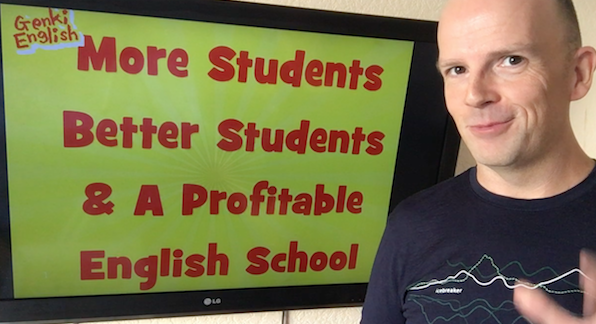 Wow, there were so many great comments on the Compass directions thread last time – thank you!
Wow, there were so many great comments on the Compass directions thread last time – thank you!
I’m working on some ideas and will hopefully have some demos on the beta test forum soon (just as soon as I finish all the workbooks!)
So… the next question, which I’d love your help with, is ….
Which future tense do you teach first? “I will …..” or “I’m going to ……” ?
Answers in the comments please – I’ve also got some really cool ideas for this one too!
Thanks for the help!
Be genki,
Richard




Hi Richard!
“I will”
Claudine
I don’t consciously teach one before the other. I tend to use whatever comes naturally in the context I am using. I don’t know if this helps but of the 5 English textbooks used in Japan and listed on the Englipedia website, both are taught in the same lesson/chapter.
Three start with ‘be going to’ and 2 start with “will”
I use I’m going almost in the beginning of my teaching. I also teach them that they’re going to hear “I’m gonna” because that’s the way we talk–informal, street language. Using the future “I will..” I don’t present until second semester.
Going to. I guess students get it fast. And we use it with cebrations
I’m going to
I use going to first.
‘will’ is the easiest but ‘be going to’ follows quickly behind it
For kids, Will.
I like to teach “Do you…?” and then “Can you…?” first.
After they know the pattern then I think “will” is easier for them to pick up.
For adults, both. And same as Janet said, I try to make a big point out of the way it’s actually said in real life.
I don’t teach this formally at elementary school but I touched on this briefly with some elementary classes during the run up to Halloween – What will you be wearing at the Halloween party? I will be wearing a skeleton costume, or I’ll be going as a witch etc.
Also, what will you be doing at the weekend? I will be playing football, going shopping, seeing my friends etc.
I teach ‘going to’ first. Going to is the planned future. And so much in life is planned. ( I am going to play tennis tomorrow….meaning I’ve probably reserved a court). Will is the unplanned future. We use it, for example, when we volunteer (I will do it.), when speculating. (I will be rich someday) or when inviting someone to do something. (Will you come to my party?)
Hi!!
I teach both at the same time; I mean in the same session; I like every time to make a comparation to make easy the topic for my students.
Regards,
Oli
Hi every body
I think – Iwill – is easier and they get it fast
Hi,
will- easier form
same as gumby from my side.
Though often I follow GE songs and there are more with “I will” it seems.
But somehow I do both however they appear.
Hi Richard!
I prefer “will” it’s the easiest form and follows the same pattern as “can” .
Nena
I start of with “going to” as this is the “planned future”.
I teach “will” first. Easy to understand and to use.
Hi Richard
‘I will’
Stephen
“I’m going to” is used from the very beginning and goes without saying. So I teach only “I will”.
to be going to – first, present continuous for future arrangements, then Future Simple
Kids get will/shall in every boring textbook they ever see. And said lessons are relatively useless because most of the time we say ‘ll and it’s the strangest thing they’ve ever heard… I’ll, AI-ULL or You’ll YULL or YULE… and so teaching them “will” for listening is less than useful. You have to get off of “will” ASAP if they have the goal of understanding spoken English.
if they are dealing with “real” speakers of English they need “gonna” first. Like it, hate it, love it… it’s all I ever hear on the news, the radio, songs… everywhere. The reality of whether or not it’s “Good English” is irrelevant. It’s “acceptable” in the linguistic sense. When Barak Obama or George Bush (in particular) address the world… their speech is full of gonna sparsely peppered with “-‘ll” and Will is almost exclusively used to draw attention to a forceful statement.
So, I vote for “gonna” in the interest of providing access to “real/authentic” spoken English.
We do a calendar session at the beginning of every class: yesterday was…, today is…., tomorrow will be
at the risk of double posting… I would buy a song by Richard that was inspired by the “Bad Boys” song by “Inner Circle” “Watcha gonna do, watcha gonna do when they come for you”
“Whatcha gonna eat? Whatcha gonna eat when it’s dinner time?”
how about, “Whereya gonna go when you finish here?”
again… grammar is irrelevant… how many times have you heard a native speaker express the future tense with, “Whatcha gonna …?”
Will
It just fits better with Can you, Do you etc. Avoids all the porblems of the to be verb that needs to change for each person. 🙁
First the near future: I’m going to do this or that…We are going to play…
I teach “will” first.
first will be verb “to be”, simple present tense, than simple past tense and than future tense with “will”, that is my opinion and how i learn to teach,
greatings
I tend to begin with ‘going to ‘ because at the end of my classes, I usually ask them what they are going to be doing that evening or weekend. Also, it’s easier to explain in Spanish as the rule of using the infinitive form of the verb is the same as in English ie; what are you going ‘to do, to eat, to draw’ etc.
Hi, here in my country, I’m going to… because it’s easier for students:
-They know verb TO BE.
-They know pressent continuous.
-They only have to add another verb.
And because, as teacher,I always have a look to new materials, books… and programme guides and, it’s the first future in everyone.
Will appear after past because if you teache I will, pupils need to learn I will not… and it’s more difficult than I’m not going…
Thank you very much.
I’m Sorry because I sometimes would like to share pictures and videos teachin english with you, because I learn with yours, but I don’t know how to do. If someone could help me I would be very grateful.
I start with “I am going to”, because is based in the natural process as I teach English: be-verb+ing-…
and finally will as another type of future tense.
As it is more meaningful to talk about plans for future, I am in favour of teaching “be going to” first; however, this may change depending on the coursebook we use. Our current coursebook also gives “be going to” first, which I like. When it comes to “will”, it is a modal auxiliary more than a tense auxiliary. Therefore, teaching it later on is more meaningful.
‘going to’ is in all the textbooks I’ve seen, I bet because it uses ‘be’… so I’ve used it first to talk about this afternoon or this weekend ‘what are you going to do?”
However, kids can pick up on ‘will’ very easily
This almost sounds like two songs again.~~~~~.
going to definetly, just as is more commonly used.
Teaching ‘will’ first is easier as you only need to add this word before any verb. ‘Going to’ requires the ‘to be’ verb before it, making it a bit more complicated.
I’d love to see both used in a GE song, but if only one can be used, I think ‘will’ is easy enough to teach without requiring a song and a ‘going to’ song would provide better practice for the students.
I tend to teach ‘I am going to’ first.
Thanks.
Our curriculum presents “I will” first, though I drop the “I’m going to…” in on the kids in my normal speaking.